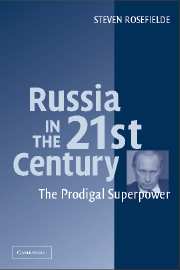Book contents
- Frontmatter
- Contents
- List of Figures and Tables
- List of Acronyms
- Preface
- Acknowledgments
- RUSSIA IN THE 21ST CENTURY
- Introduction
- 1 After “The End of History”
- 2 Prodigal Superpower
- 3 Structural Militarization
- 4 What Could Have Been Done?
- 5 Muscovite Metamorphosis
- 6 Military-Industrial Reform
- 7 National Vulnerabilities
- 8 The Miasma of Global Engagement
- 9 Putin's Choice
- 10 Candor
- Conclusion
- Glossary
- Notes
- Selected Bibliography
- Index
10 - Candor
Published online by Cambridge University Press: 18 December 2009
- Frontmatter
- Contents
- List of Figures and Tables
- List of Acronyms
- Preface
- Acknowledgments
- RUSSIA IN THE 21ST CENTURY
- Introduction
- 1 After “The End of History”
- 2 Prodigal Superpower
- 3 Structural Militarization
- 4 What Could Have Been Done?
- 5 Muscovite Metamorphosis
- 6 Military-Industrial Reform
- 7 National Vulnerabilities
- 8 The Miasma of Global Engagement
- 9 Putin's Choice
- 10 Candor
- Conclusion
- Glossary
- Notes
- Selected Bibliography
- Index
Summary
The terrorist attacks on 9/11 and the Iraq war provide an invaluable opportunity to reassess prevailing strategies of global engagement. Throughout the Cold War and the first phase of the “end of history,” great powers and superpowers sought advantage by filtering reality through the lenses of their public cultures while searching for pragmatic compromises. American free enterprisers and European social democrats trumpeted the idea of the West, each with their special spin, the Soviets propounded Marxist-Leninism, but the subtext in the East and West was usually about conflict management on terms everyone could abide. This is why there was no third world war. Crises tended to erupt only when targets of opportunity like postwar Eastern Europe or missile bases in Cuba proved too tempting.
This fragmented engagement required an artfulness that was sometimes lacking, and it often spawned confusion because the criteria of success were fuzzy. Just as individuals disguise their hidden agendas from themselves and others by espousing lofty ideals, makers of foreign policy aren't always guided by their declared principles. During the Cold War, it was never clear whether advancing ideals, pursuing hidden agendas, or avoiding conflict was primary or whether declaratory goals were desirable or realistic. Idols of perception, as Francis Bacon observed in the sixteenth century, blur objectivity and warp policy. Americans, Europeans, and the Soviets had panaceas that were trotted out on all occasions (free enterprise, corporatism, and central planning) even though many knew that no economic system was universally applicable.
- Type
- Chapter
- Information
- Russia in the 21st CenturyThe Prodigal Superpower, pp. 123 - 130Publisher: Cambridge University PressPrint publication year: 2004



